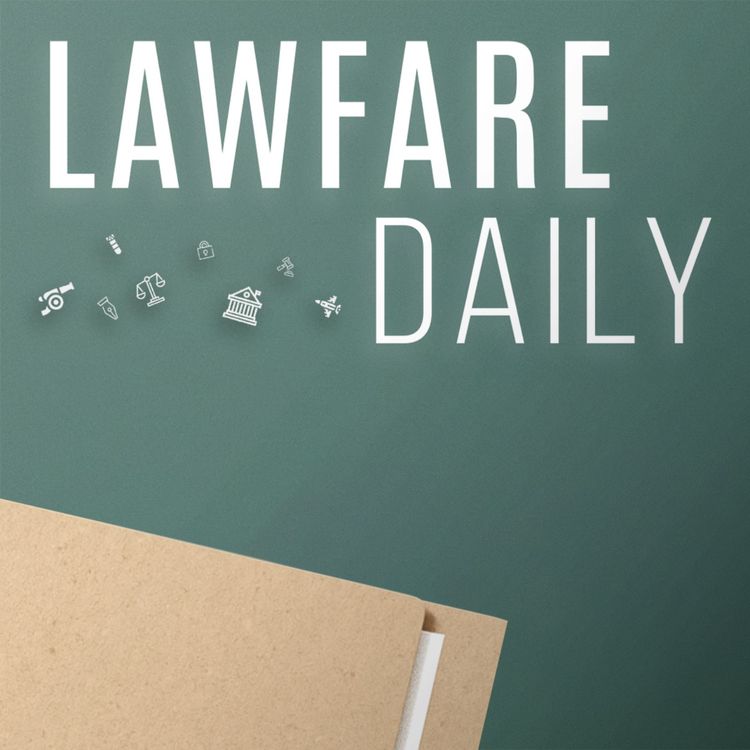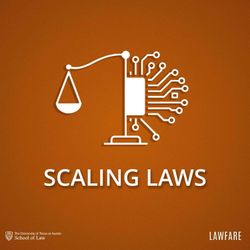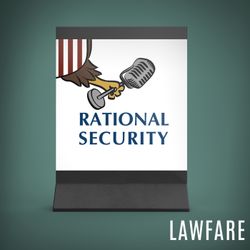Share

The Lawfare Podcast
Part One of the PCLOB on FISA Section 702
On September 28, the Privacy and Civil Liberties Oversight Board, or PCLOB, issued its long-awaited report on FISA Sec. 702, a surveillance authority that is set to expire on December 31 if it is not reauthorized by Congress. The report was supported by only three members of the Board, with the two minority members issuing their own separate statement. The three-two split was along party lines.
Lawfare Senior Editor Stephanie Pell sat down with four members of PCLOB, the Chair, Sharon Bradford Franklin, and board members Travis LeBlanc, Beth Williams, and Richard DiZinno. Board member Ed Felten could not join due to medical reasons. In this first of two episodes, they talk about areas on which the members substantially agree, the compliance problems that have plagued the FBI, and each side’s different recommendations for how to address those compliance problems. In tomorrow’s podcast, they talk about the members’ views on the privacy and civil liberties risks posed by Section 702, and each side’s differing recommendations for how to address these issues, with a special focus on the recommendation that is the most serious point of contention among the two sides.
More episodes
View all episodes

Lawfare Archive: Content Moderation Comes for Parler and Gettr
57:19|From September 9, 2021: Let’s say you’re a freedom-loving American fed up with Big Tech’s effort to censor your posts. Where can you take your business? One option is Parler—the social media platform that became notorious for its use by the Capitol rioters. Another is Gettr—a new site started by former Trump aide Jason Miller.Unfortunately, both platforms have problems. They don’t work very well. They might leak your personal data. They’re full of spam. And they seem less than concerned about hosting some of the internet’s worst illegal content. Can it be that some content moderation is necessary after all?Today, we’re bringing you another episode of our Arbiters of Truth series on the online information ecosystem. Evelyn Douek and Quinta Jurecic spoke with David Thiel, the big data architect and chief technical officer of the Stanford Internet Observatory. With his colleagues at Stanford, David has put together reports on the inner workings of both Parler and Gettr. They talked about how these websites work (and don’t), the strange contours of what both platforms are and aren’t willing to moderate, and what we should expect from the odd world of “alt-tech.”To receive ad-free podcasts, become a Lawfare Material Supporter at www.patreon.com/lawfare. You can also support Lawfare by making a one-time donation at https://givebutter.com/lawfare-institute.
Lawfare Archive: The Trump Administration’s Latest Moves to Dismantle the Iran Nuclear Agreement with Peter Harrell and Richard Nephew
37:04|From June 8, 2020: On May 27, the Trump administration announced that it was withdrawing sanctions waivers that had allowed Russian, Chinese and European companies to work with Iran on sensitive Iranian nuclear sites in support of the goals of the 2015 Iran nuclear agreement. Margaret Taylor talked about what it really means with two experts: Peter Harrell, an attorney and adjunct senior fellow at the Center for a New American Security, and Richard Nephew, senior research scholar at the Center on Global Energy Policy at Columbia University. They talked about what has happened since the Trump Administration decided to withdraw from the Iran nuclear agreement in 2018 and what difficulties a new presidential administration may encounter in re-joining the agreement.To receive ad-free podcasts, become a Lawfare Material Supporter at www.patreon.com/lawfare. You can also support Lawfare by making a one-time donation at https://givebutter.com/lawfare-institute.
Scaling Laws: How AI Can Transform Local Criminal Justice, with Francis Shen
52:51|Alan Rozenshtein, research director at Lawfare, spoke with Francis Shen, Professor of Law at the University of Minnesota, director of the Shen Neurolaw Lab, and candidate for Hennepin County Attorney.The conversation covered the intersection of neuroscience, AI, and criminal justice; how AI tools can improve criminal investigations and clearance rates; the role of AI in adjudication and plea negotiations; precision sentencing and individualized justice; the ethical concerns around AI bias, fairness, and surveillance; the practical challenges of implementing AI systems in local government; building institutional capacity and public trust; and the future of the prosecutor's office in an AI-augmented justice system.Find Scaling Laws on the Lawfare website, and subscribe to never miss an episode.To receive ad-free podcasts, become a Lawfare Material Supporter at www.patreon.com/lawfare. You can also support Lawfare by making a one-time donation at https://givebutter.com/lawfare-institute.
Rational Security: The “Scare Them When They’re Young” Edition
01:17:22|This week, Scott sat down with his Lawfare colleagues Tyler McBrien, Michael Feinberg, and Ariane Tabatabai to talk through the week’s big news in national security, including:“Between Iraq and a Hard Place.” Iran is engaged in perhaps its most serious bout of domestic unrest in a decade, spurred on by a failing economy and the seeming political weakness of the regime after its devastating military conflict with Israel and the United States this past summer. But the regime has struck back viciously, cutting off global media and communications access even as it has engaged in a vicious and violent campaign of repression that may have already led to as many as between 2,000 and 12,000 fatalities. That has led, among other things, to threats from the Trump administration that it may intervene militarily against the regime. What should we be making of this development? What does it mean for the future of Iran, and what role might the United States play in that future?“A Slippery Slope.” ICE’s increasingly provocative immigration enforcement actions came to a violent head last week in Minneapolis, when ICE agent Jonathan Ross shot and killed driver and possible protest participant Renee Good. While the White House has sought to frame Good as a “domestic terrorist” who threatened Ross, videos of the incident instead suggest that her conduct came nowhere close to the standard normally required for the use of lethal force. The FBI is now reportedly investigating Good’s widow for ties to activist groups, an effort that led several career federal prosecutors to quit this week. How effective are the administration’s attempts to shape the truth likely to prove? “Green with Envy.” Diplomatic representatives from Denmark and Greenland are meeting with senior administration officials as we record to discuss a way forward on Greenland, the self-governing and all-but-independent Danish territory that President Trump has openly coveted since returning to office, up to and including the threat of military force to acquire it. How serious should the world take these threats? Where is the competition over Greenland likely to lead?In object lessons, Tyler is setting the mood with a recommendation of Way Dynamic’s album “Massive Shoe.” Mike is boosting our moods with a preview of “One Movie After Another,” a retrospective of Paul Thomas Anderson films, coming soon to the AFI Silver Theatre in Silver Spring. Scott is setting some mood lighting with his Xenomorph-like bedtime reading light from Glocusent. And Ari is getting moody with a revisit of Pedro Almodóvar’s “Pain and Glory.”To receive ad-free podcasts, become a Lawfare Material Supporter at www.patreon.com/lawfare. You can also support Lawfare by making a one-time donation at https://givebutter.com/lawfare-institute.
Lawfare Daily: Entrepreneurial Federalism and the New National Security, with Ashley Deeks and Kristen Eichensehr
42:36|On today's episode, Lawfare Senior Editor Scott R. Anderson sits down with Lawfare Contributing Editor Professor Ashley Deeks of the University of Virginia School of Law and Professor Kristen Eichensehr of Harvard Law School to discuss their recent article entitled, "Federalism and the New National Security," recently published in the Harvard Law Review.Together, they discuss the new ways that states are engaging in national security policy (which Deeks and Eichensehr call "entrepreneurial federalism"), the costs and benefits of such practices, and strategies for how the states and the various branches of the federal government should engage with them.To receive ad-free podcasts, become a Lawfare Material Supporter at www.patreon.com/lawfare. You can also support Lawfare by making a one-time donation at https://givebutter.com/lawfare-institute.
Lawfare Daily: The U.S. Foreign Service at a ‘Breaking Point,’ with John Dinkelman
28:47|On today’s episode, Lawfare Managing Editor Tyler McBrien sits down with John Dinkelman, president of the American Foreign Service Association (AFSA), to discuss his organization’s latest report, entitled, “At the Breaking Point: The State of the U.S. Foreign Service in 2025.” They talk about why AFSA undertook such a project after the federal government workforce survey was canceled earlier in the year, the report’s major findings, and why a robust foreign service is vital to U.S. national security.To receive ad-free podcasts, become a Lawfare Material Supporter at www.patreon.com/lawfare. You can also support Lawfare by making a one-time donation at https://givebutter.com/lawfare-institute.
Lawfare Daily: The Latest in Iran, with Richard Nephew
53:40|Iran is once again witnessing large-scale protests, on which the regime is cracking down through mass arrests and deadly force. President Trump has stated that the United States would come to the rescue of Iranians if the regime continues to kill protestors. Meanwhile, Tehran continues to reconstitute its nuclear program, which was damaged during the 12-day war over the summer. President Trump has threatened to eliminate Iran’s nuclear and missile programs if Tehran does not stop rebuilding its capabilities. Iran’s regional standing remains diminished, though its relationships with Russia and China continue even as tensions create limits to cooperation. On today’s episode, Lawfare Public Service Fellow Ariane Tabatabai sits down with Richard Nephew, Senior Research Scholar at the Center on Global Energy Policy at Columbia University and former Deputy Special Envoy for Iran, to discuss the latest developments in Iran, take stock of U.S. policy toward Iran during President Trump’s first year back in office, and offer indicators for what to expect next.To receive ad-free podcasts, become a Lawfare Material Supporter at www.patreon.com/lawfare. You can also support Lawfare by making a one-time donation at https://givebutter.com/lawfare-institute.
Lawfare Daily: The Trials of the Trump Administration, Jan. 9
01:40:30|In a live conversation on YouTube, Lawfare Editor in Chief Benjamin Wittes sat down with Lawfare Senior Editors Roger Parloff Michael Feinberg and Eric Columbus to discuss the shooting by an ICE agent in Minnesota, what the Maduro indictment means for the Alien Enemies Act cases, the disqualification of the U.S. attorney for the Northern District of New York, and moreYou can find information on legal challenges to Trump administration actions here. And check out Lawfare’s new homepage on the litigation, new Bluesky account, and new WITOAD merch.To receive ad-free podcasts, become a Lawfare Material Supporter at www.patreon.com/lawfare. You can also support Lawfare by making a one-time donation at https://givebutter.com/lawfare-institute.
Lawfare Archive: Former Ambassador Roberta Jacobson on the Mexico Presidential Election
45:12|From June 18, 2024: On June 2, Mexico held one of the largest elections in its history and the electorate voted in the country's first women, and Jewish, president, Claudia Sheinbaum. Sheinbaum was endorsed by outgoing President Andrés Manuel López Obrador (AMLO), who critics charge as pushing a series of anti-democratic policies including a substantial judicial overhaul. To discuss this historic election and what President-elect Claudia Sheinbaum may do in office, Lawfare Associate Editor for Communications Anna Hickey sat down with former United States Ambassador Roberta Jacobson. They discussed the issues voters were concerned about, political violence by cartels plaguing the country, and whether Sheinbaum will follow AMLO's trajectory as a populist or chart her own path. To receive ad-free podcasts, become a Lawfare Material Supporter at www.patreon.com/lawfare. You can also support Lawfare by making a one-time donation at https://givebutter.com/lawfare-institute.